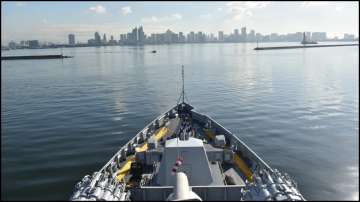'Shouldn't harm interests..': China vexed over India-Philippines naval exercises in South China Sea
Earlier this month, INS Kadmatt visited the Philippines and participated in a maritime exercise in the South China Sea alongside BRP Ramon Alcaraz, an offshore patrol vessel of the Philippine Navy. China has been locked in a tense maritime stand-off with the Philippines over territorial claims.

The recent naval exercises between India and the Philippines on the disputed Souhave left the Chinese military miffed as it made a stern warning on Thursday that defence cooperation between different countries should not harm the interests of third countries and regional peace.
Wu Qian, the spokesperson of the Chinese Defence Ministry, made the remarks while answering a question from reporters about naval exercises between an Indian ship and a Philippine vessel, alongside plans by France to hold naval and air drills with the Philippine Navy. He said that China has taken note of the reports.
Earlier this month, INS Kadmatt during its visit to the Philippines participated in a maritime exercise in the South China Sea alongside BRP Ramon Alcaraz, an offshore patrol vessel of the Philippine Navy. The exercise is aimed at bolstering maritime cooperation between India and the Philippines.
"China has always emphasised that defence and security cooperation between relevant countries must not harm the interests of third parties or hurt regional peace and stability," Wu said. He also asserted that ongoing tensions between Beijing and Manila are an issue between the two countries and no third party has the right to intervene.
"China will maintain a high degree of vigilance and take necessary measures to resolutely safeguard national sovereignty, security and maritime rights and interests," he further said, accusing the Philippines of disregarding repeated warnings and intruding into areas claimed by China.
Tensions flare at the South China Sea
Tensions have flared particularly between China and the Philippines, with both countries trading accusations over a series of maritime run-ins, including China allegedly ramming a ship this month carrying the Philippines' military chief.
The Philippine coast guard accused China of firing water cannons and ramming resupply vessels and a coast guard ship, causing "serious engine damage" to one, while China's coast guard said the Philippine vessel intentionally rammed its ship.
China claims almost the entire South China Sea, a conduit for more than $3 trillion of annual ship-borne commerce, including parts claimed by the Philippines, Vietnam, Indonesia, Malaysia and Brunei. The Philippines has maintained that it is not provoking any conflict in the disputed waters and has stuck by its claim on the Second Thomas Shoal.
Philippines' claim over the 200-mile Scarborough Shoal lies was upheld by an arbitration decision in 2016 under the 1982 UN Convention on the Law of the Sea. However, China refused to recognise the 2016 arbitration ruling amid tense standoffs in the region.
Chinese coast guard ships have also blocked Filipino government vessels delivering supplies and personnel to the Second Thomas Shoal, resulting in near-collisions that the Philippine government has condemned and protested.
Friction point of US-China ties
China's aggression in the South China Sea has put it in conflict with many Asian countries. A major clash can also involve the United States, which has vowed to defend the Philippines if any Filipino forces, ships and aircraft are attacked. The US has accused China of violating international law by "intentionally interfering" with the Philippines vessels.
China also recently accused an American naval ship of “illegally intruding” into waters near the Second Thomas Shoal. It said that the US is meddling in waters far from its shores and renewed its accusation that America is the one raising regional tensions following the sailing of the USS Giffords, a littoral combat ship designed to operate in coastal areas, near Second Thomas Shoal.
About the US criticism of actions by Chinese coastguard ships against the Philippines vessels and reference to Washington’s commitments under the Mutual Defence Treaty with Manila, Wu said that China is strongly dissatisfied with such remarks and firmly opposed to this, reiterating 'indisputable sovereignty' over the areas claimed by Manila.
"The United States continues to strengthen its Asia-Pacific deployments, this is full of a Cold War mindset. Its goal is for its own selfish gains and to maintain its hegemony. Its nature is to stoke confrontation," he said.
(with inputs from PTI, Reuters)
ALSO READ | Xi vows to prevent anyone trying to 'split' Taiwan from China as tensions flare ahead of elections